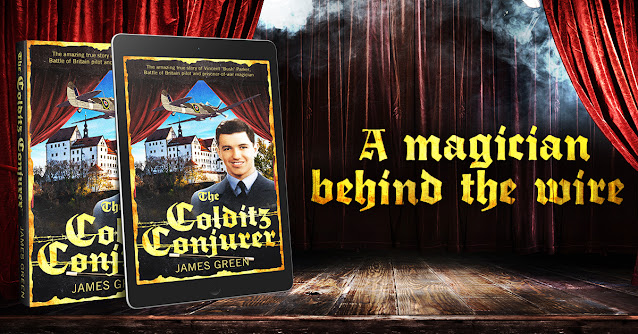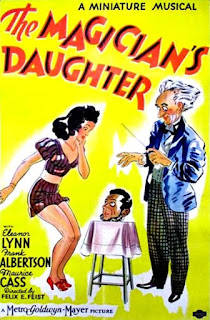Paul Potassy: "Magic saved my life"
In this incredible personal story, magician Paul Potassy gives a thrilling first-hand account of how magic literally saved his life during winter operations in World War Two...
Austrian by birth, Paul Potassy (Paul Ludwig Alexander of Potassy) (1923-2018) developed an early interest in magic and was performing in cabaret and other public venues before he finished high school. With the German annexation of Austria in 1938, the family was relocated to Berlin, where Paul got to see many top magic acts of the day. He went on to university to study engineering. But, he wanted to become a professional magician and, in 1940, he joined the German Magic Circle as its youngest member.
Soon after, World War Two intervened to halt his plans. He was conscripted into the Germany Army in November 1941 and sent off to complete his basic military training on the Eastern Front.
Fifteen months later, on the 25 February 1943, aged 19, Potassy found himself on the Eastern Front in Russia. It was the tail end of the Battle of Stalingrad. The Axis Powers were in a partial retreat after they had failed to capture the city and the Red Army had launched a counter offensive. Potassy was manning an observation post along with eight other soldiers, looking out for the Soviet troops.
With temperatures of -25 degrees centigrade, it was bitterly cold, and the area was covered in deep snow. As dawn broke at 5 a.m., a Russian battalion attacked the outpost, with five tanks and 300 men. Faced with these overwhelming forces, Potassy and his colleagues, stood up, turned and ran for their lives.

Soviet Union troops on winter operations in World War Two
(Source: Public domain)
With the Russians in hot pursuit and small arms fire whizzing passed him, Potassy decided that the game was up. He dropped to the ground and played dead to avoid detection.
“We had winter uniforms, white on one side and green on the other side. The white side was out. I took the hood, pulled it over my head and put my pistol underneath myself. The Russian attack went over me. Six of my comrades were shot. Two ran away and I survived. So, I had been very lucky. I was lying still, with my eyes closed. Suddenly, I heard voices. Under my hood and with my eyes closed and I looked out and saw two moving figures. It was two Siberians with huge bayonets.”
The soldiers worked their way across the killing grounds, stabbing bodies with their bayonets to finish a grisly job, and grabbing the identification tags from the bodies of the soldiers.
“They smelled, against the wind, of vodka. I watched, as they started to take the tags off the dead soldiers and take whatever else they found as private souvenirs.”
Next, the Russians turned to Potassy’s still body. He was ice cold, so the searchers didn’t feel he was alive. One of them took out Potassy’s cigarette case and pocketed it. He went on with his search and somehow put his hand underneath Potassy’s body. There, he found the hidden pistol. Despite the vodka, the Siberian quickly realised it was odd for a dead soldier to have a concealed weapon and he yanked off Potassy’s snow hood.
“I opened my eyes. He had the pistol in his hand. He put the safety lock off and put it to my head. I thought this was the end of my life,” recalled Potassy.
Then, somehow, the magician-soldier had the idea to say the word 'artist'. “Artist, artist, artist” he announced, begging for mercy and gesturing the soldier’s attention to the upper pocket of his uniform.
“He looked at me and I opened up the pocket and pulled out a deck of playing cards, which I kept to entertain my friends when there was no fighting going on. I took the deck of cards out, while he kept the pistol pointed at me, ready to pull the trigger. I then started to do some basic card manipulation, using sleight of hand to some quick visual tricks. The Russian started to smile and called out to his friend. ‘Yuri, Yuri, Yuri, look at him!’. I kept doing the tricks, pulling cards from here and there. I have never in my life invented as many places to produce cards from. Then, he took the pistol away and smiled. Magic had saved my life.”
Potassy was convinced that the Russian soldier would have shot him. The other Axis soldiers were already dead, one more or one less wouldn’t matter.
“At that moment, the Germans started to counter-attack and bullets started to land in the snow around us. So, the two Russian took me behind a mound, so I was protected. Then, they took me to their commander who was four hundred metres behind and right away I had to do card tricks again. And that’s what I did for the 360 kilometres we walked from there to the first prison camp, I did nothing else but card tricks, and card tricks and card tricks.”
Paul Potassy (1923-2018)
(Source: Magischer Zirkel)
After his capture in 1943, Paul Potassy was sent to a prisoner-of-war camp in Lededjan in Central Russia. He spent four-and-a-half years interned in the prison camp, enduring brutal conditions. Fortunately, he was given the rank, or role, of an 'artist,' which exempted him from hard labour in the quarries.
“Other privileges included a private room, a small stage, and a set of top hat and tails scissored together from the black uniform worn by the general of a Panzer division,” according to John Fisher, a British T.V. producer and magic author.
Potassy's role was to perform for the guards, support staff and their families, but his magic skills also kept up the morale of his fellow prisoners.
He was transferred from Lededjan to another camp at Ryasan, probably in 1944. There, he was also called on to perform magic to keep his captors amazed and amused in regular shows. To expand his repertoire, Potassy put together tricks and illusions he remembered from pre-war magic catalogues. He was helped by fellow POW Martin Knaute, a mechanic by profession. Among their accomplishments was a makeshift version of the Aga Levitation. Occasionally a Russian Jew who worked at the camp, Anthony Perkins, would also help out, by buying Potassy new packs of playing cards to perform with.
After the war he would recount a trick involving a dark Russian bread called ‘khleb’.
“I made three bread balls out of the bread, swallowed the bread balls, hit myself on the head and the bread balls came out and then disappeared again. I did the trick about six times per day and ate a lot of bread as a result.”
This crafty trick helped keep Potassy’s energy sustained, in the face of meagre food rations.
Of the 2.4 million German Army POWs in the Soviet Union, almost fifteen percent died in captivity. The Russians had not signed the Geneva Convention on the treatment of prisoners-of-war.
Fortunately, Paul Potassy's performing abilities helped him both to survive and to make life more bearable for his fellow prisoners (and the guards). Fisher wrote that Potassy was, “spurred on by a restless energy and a code of sheer human decency in inhuman conditions, he clung to his love of magic for survival with only a distant dream of the heights he might one day achieve.”
On his release from captivity, in June 1947, Potassy had no appetite for a career in engineering and turned to magic full-time. He was accepted into the Variety Artists' Union and played his first full-time professional engagement in Budapest in December that year. He went on to become a well-known magician in Hungary. He also guested in Poland and Austria. He learned to perform his act in several languages and became one of the few ‘talking‘ magicians able to perform in front of an international audience. An appearance on Austrian television in 1957 boosted his career and, by the 1960s, he was working in Europe, the Middle East, North Africa and in America.
Having learned Russian whilst a POW, he also returned to Russia, where he was well received due to his ability to perform magic in the country’s native language.
Paul Potassy on the Paul Daniels Magic Show (1985)
(Source: B.B.C.)
Potassy’s repertoire consisted of only a few tricks - such as the Sympathetic Silks, the Razor Blades, the Torn and Restored Newspaper - which he presented with charm and intelligent wit. But, with this simple act – performed mainly in top hotels and for exclusive events - he became an accomplished star of the international world of cabaret magic.
Paul Potassy lived to the age of 95, but his long life could have been cut terribly short, had it not been for a pack of cards and his ability to do magic.
Much of this article has been adapted from a video interview conducted with Paul Potassy by Max Maven for L&L Publishing, on the DVD set called 'The Magic of Paul Potassy'. John Fisher's 'Heroes of Magic' contains a chapter on Potassy's life and provided additional detail.
*** AVAILABLE NOW ***
The Colditz Conjurer tells the amazing true story of Flight Lieutenant Vincent ‘Bush’ Parker, Battle of Britain pilot and prisoner-of-war magician.
Written by the Magic at War team, The Colditz Conjurer is a remarkable tale of perseverance, courage and cunning in the face of adversity. It features over 55 original photographs and maps. 126 pages.









Comments
Post a Comment